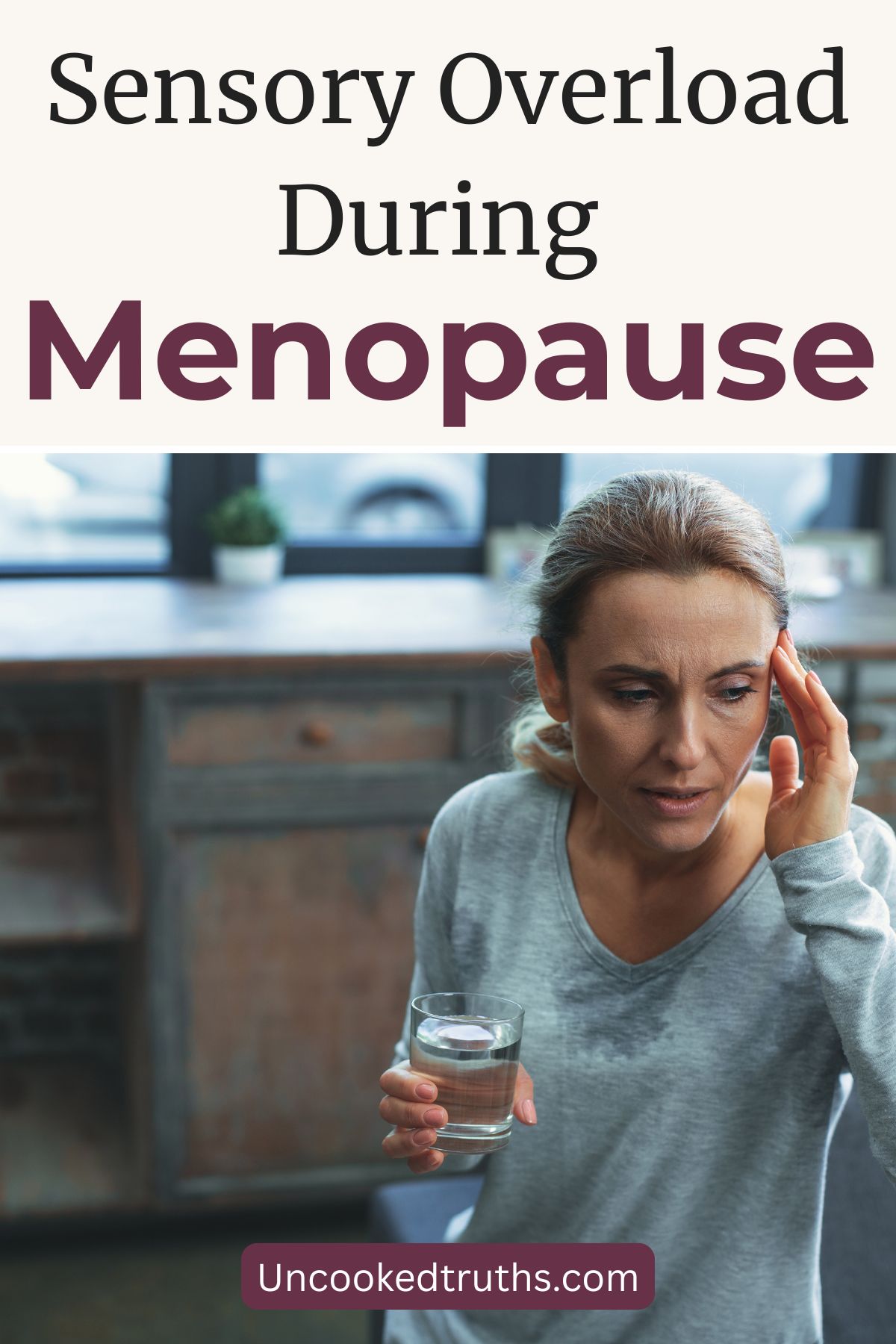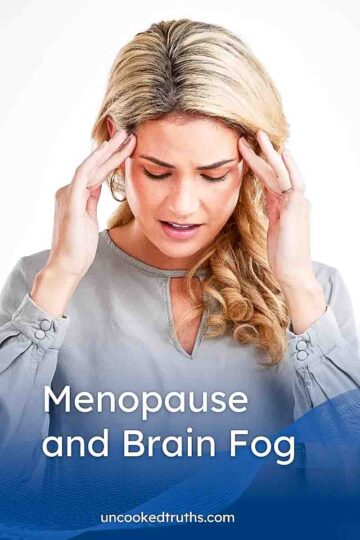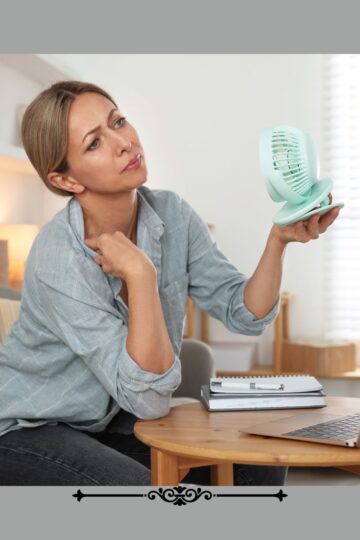Many women in perimenopause and menopause start noticing something strange: sounds feel louder, crowds are overwhelming, and even soft clothes suddenly feel like sandpaper. This kind of sensory overload isn’t just in your head; it’s a very real, very physical symptom that shows up for many women during midlife, even though no one seems to talk about it.
If you want more on all the symptoms no one told you about, read The Many Faces of Menopause: Symptoms No One Warned You About.
In this article, we’ll look at why it happens, how it shows up in real life, and what might help if the world has become just a little too much.

Jump to:
Not Every Woman Will Relate, And That’s Okay
Let’s be honest: not every woman going through menopause experiences this kind of overstimulation. Some sail through with barely more than a few hot flashes and a cycle that quietly disappears. If that’s your experience, great. But for the rest of us, the change can feel intense and relentless, and it doesn’t always look like what menopause is “supposed” to be.
Read: Why Is Hormone Therapy Treated Like a Dirty Word?
This article is for the women who can’t walk through a supermarket without getting overwhelmed by the "too many noises at once". For the ones who come home from loud places and need to sleep. For those who can’t stand the sound of someone's chewing, the feeling of a waistband, or the background noise of the world that never seems to shut up. If you’re not in that camp, that’s okay too, you are some of the lucky ones.
What’s Actually Going on Here (Spoiler: It’s Menopause Talking)
You walk into a store, and it feels like you’ve stepped onto the set of a game show. Blinking lights. Aggressive music. Loudspeaker announcements. People weaving around you like it’s bumper car night at the fair. Your bra is trying to slice you in half, your waistband’s staging a rebellion, and all you want to do is go home and sit in silence.
Meanwhile, your husband is chewing his food like it’s a competitive sport. Or worse, he’s just breathing too loudly. Yes, that’s a thing now.
This isn’t you being overly sensitive or cranky. It’s your nervous system waving the white flag. And yes, it’s connected to menopause, even if nobody puts this on the symptom checklist.
Let’s Talk About Why Your Body’s Suddenly Acting Like This
Hormones are shifting. Estrogen is declining. Cortisol regulation goes sideways. The filters you once had, the ones that let you block out background noise, bright lights, itchy fabrics, they weaken or disappear. Your tolerance shrinks. Your senses stay on high alert.
Research shows that lower estrogen levels can increase sensitivity to sound, smell, light, and touch. That’s why the perfume aisle feels like chemical warfare, why jeans feel like denim armor, and why even normal household noise starts to grate on you.
There’s also growing research around how menopause interacts with ADHD traits or neurodivergence. Women with sensory sensitivity often feel their symptoms spike during perimenopause. The volume goes up, and the buffer goes down.
My own experience
There’s no polite way to say this: midlife makes you allergic to nonsense. And I don’t mean that metaphorically. I mean it literally.
I once went to a supermarket where the music was blasting, the shelves were crowded, people were talking into phones on speaker, like they were in a reality TV show, and the fluorescent lights were glaring down like interrogation beams.
By the time I got home, I had to lie down and sleep for three hours. Not out of laziness, but because it felt like my brain had glitched. My internal system couldn’t process anything else.
And it's not just stores. I’m talking about loud neighbors in the building I live in. Kids stomping above me like a herd of elephants. My nervous system can’t filter these things anymore. Every noise feels invasive, like it goes straight into my body. It doesn’t matter how much estrogen I take, this part hasn’t improved much.
That’s not me being dramatic. That’s a nervous system trying to keep functioning in a world that refuses to be quiet.
How I Try to adapt
Here’s what I started doing, not because I’m delicate, but because I’d like to stay married and avoid prison:
I shop online. Grocery stores are a war zone of sound, motion, and bad lighting. I’d rather click buttons in my pajamas than dodge carts and perfume clouds. No announcements. No chaos. Just peace and delivery.
I buy clothes online too. Dressing rooms are fluorescent nightmares. They make me hot, sweaty and impacient. I want to try clothes in my house, with my mirror, my lighting, and no one waiting outside the curtain.
I wear soft clothes. My closet is now made of cotton, jersey, and stretchy materials that don’t insult me. If a waistband leaves a mark, it’s dead to me.
I leave when I need to. Overstimulated in a restaurant, store, mall, or any other crowded place? I leave. Husband playing TikToks on full volume? Earbuds in. No permission slips. Just self-preservation.
What About Medical Options?
For some women, sensory overload eases once their hormones are balanced. If your estrogen is in the basement, hormone replacement therapy (HRT) may help, not just for mood or sleep, but for this kind of raw-edged, everything-is-too-much feeling.
But it’s not one-size-fits-all. Some women thrive on HRT. Some feel worse. Some need months to find the right dose or delivery method. And some find it doesn’t help this symptom at all.
For the record, I’m on estrogen. I’ve played with doses. I’ve tried different delivery methods. And still, there are days when my brain reacts to the world like a fried motherboard. So if you’re already doing everything “right” and still feel overstimulated, you’re not crazy. You’re just living in a body that’s doing its best to adapt.
More on that here: Breaking the Silence Around Menopause Hormone Therapy
What If You Can’t Take HRT?
Not every woman is a candidate for hormone therapy, and not every woman wants to be on it. For some, it’s a medical decision. For others, it’s personal. Either way, you should know that hormone replacement isn’t the only path to relief.
There are other ways to support your body if you’re dealing with sensory overload during menopause. Some women work with healthcare providers who specialize in non-hormonal options for nervous system regulation and symptom management.
Others explore tools that help calm the body from the inside out: better sleep habits, stress reduction techniques, and support for mood and energy. These things aren’t quick fixes, but they can reduce the intensity of your daily overwhelm.
Even simple changes, like building quiet time into your day, avoiding overstimulating spaces, or saying no to one more obligation, can shift your nervous system out of survival mode.
You don’t need a prescription to start protecting your peace.
What matters most is having a care team, or at least one trusted provider who listens. Someone who won’t brush you off just because your symptoms don’t show up on a lab report.
Let’s Name It So It Stops Feeling Personal
You’re not broken. You’re not dramatic. You’re in a transition that’s physical, hormonal, neurological, and deeply misunderstood. If your body wants softness, silence, and less stimulation, that’s not weakness. That’s wisdom.
We don’t all go through menopause the same way. Some women feel energized, clear, and strong. Others feel like their entire nervous system is short-circuiting every time they leave the house. There is no gold standard, no universal symptom checklist, and no medal for pretending everything’s fine.
What you’re feeling is real. What you need matters. And you don’t have to explain or defend it to anyone, especially not to people who haven’t lived it.
So if you need to mute the world for a while, do it. If you need to stop wearing underwire and start wearing noise-canceling headphones to dinner, do it. If your peace depends on fewer people, quieter places, and clothes that don’t leave marks, choose that life without apology.
You’re not asking for too much. You’re asking for less. And sometimes that’s exactly what the body needs.
More Articles For You
- Hormone Replacement Isn’t One-Size-Fits-All
- How Menopause Affects Marriages and What Saved Mine
- When Your Body Says ‘No Thanks’ to Exercise
- Welcome to Uncooked Truths
- Menopause in the Workplace: Impact and Solutions
- A New Era for Menopause Hormone Therapy






Leave a Reply